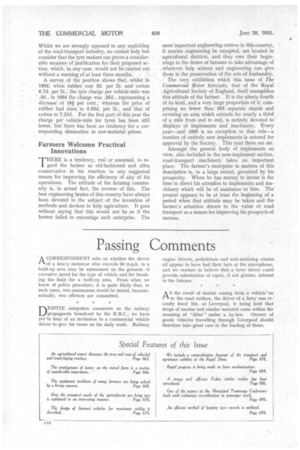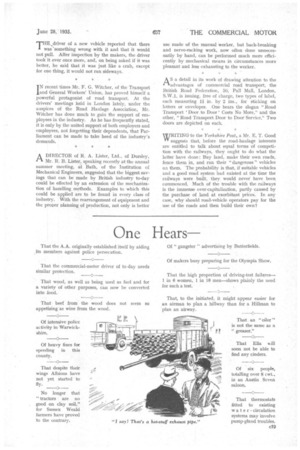Passing Comments
Page 68

Page 69

If you've noticed an error in this article please click here to report it so we can fix it.
ACORRESPONDENT asks us whether the driver of a heavy motorcar who exceeds 30 m.p.h. in a built-up area may be summoned on the grounds nf excessive speed for the type of vehicle and for breaking the limit for a built-up area. From what we know of police procedure, it is quite likely that, in such cases, two summonses would be issued, because, actually, two offences are committed.
DESPITE outspoken comments on the railway propaganda broadcast by the B.B.C., we have yet to hear of an invitation to a commercial vehicle driver to give his views on his daily work. Railway
engine drivers, pedestrians and anti-rnotOring cranks all appear to have had their turn at the microphone, and we venture to believe that a lorry driver could provide information of equal, if not greater, interest to the listener.
AS the result of mortar oozing from a vehicle on to the road surface, the driver of a lorry was recently fined 10s. at Liverpool, it being held that drops of mortar and similar material come within the meaning of "litter" under a by-law. Owners of goods vehicles travelling through Liverpool should therefore take great care in the loading of these. THE.driver of a new vehicle reported that there was 'something wrong with it and that it would not pull. After inspection by the makers, the driver took it over once more, and, on being asked if it was better, he said that it was just like a crab, except for one thing, it would not run sideways.
IN recent times Mr. F. G. Witcher, of the Transport and General Workers' Union, has proved himself a powerful protagonist of road transport. At the drivers' meetings held in London lately, under the auspices of the Road Haulage Association, Mr. Witcher has done much to gain the support of employees in the industry. As he has frequently stated, it is only by the united support of both employers and employees, not forgetting their dependents, that Parliament can be made to take heed of the industry's demands.
A DIRECTOR of R. A. Lister, Ltd., of Dursley, 1-1, Mr. R. B. Lister, speaking recently at the annual summer meeting, at Bath, of the Institution of Mechanical Engineers, suggested that the biggest savings that can be made by British industry to-day could be effected by an extension of the mechanization of handling methods. Examples to which this could be applied are to be found in every class of industry. With the rearrangement of equipment and the proper planning of production, not only is better
use made of the manual worker, but back-breaking and nerve-racking work, now often done unnecessarily by hand, can be performed much more efficicently by mechanical means in circumstances more pleasant and less exhausting to the worker.
AS a detail in its work of drawing attention to the advantages of commercial road transport, the British Road Federation, 50, Pall Mall, London, S.W.1, is issuing, free of charge, two types of label, each measuring ig in. by 2 ins., for sticking on letters or envelopes. One bears the slogan "Road Transport Door to Door' Costs No More," and the other, "Road Transport Door to Door' Service." Two doors are depicted on each.
WRITING to the Yorkshire Post, a Mr. E. T. Good yv suggests that, before the road-haulage interests are entitled to talk about equal terms of competition with the railways, they ought to do what the latter have -done: Buy land, make their own roads, fence them in, and run their " dangerous " vehicles on them. The probability is that, if suitable vehicles and a good road system had existed at the time the railways were built, they would never have been commenced. Much of the trouble with the railways is the immense over-capitalization, partly caused by the purchase of land at exorbitant prices. In any case, why should road-vehicle operators pay for the use of the roads and then build their own?




























































































































































